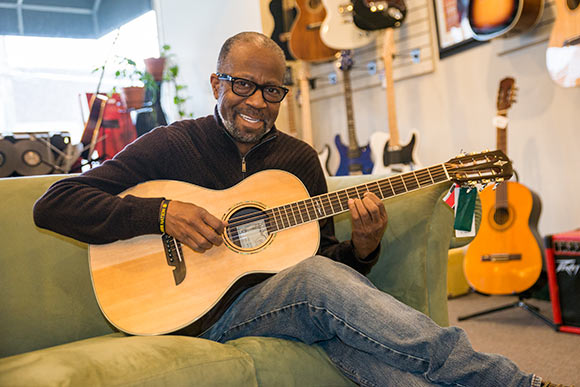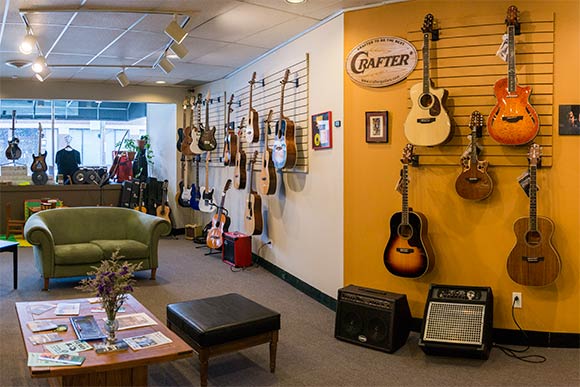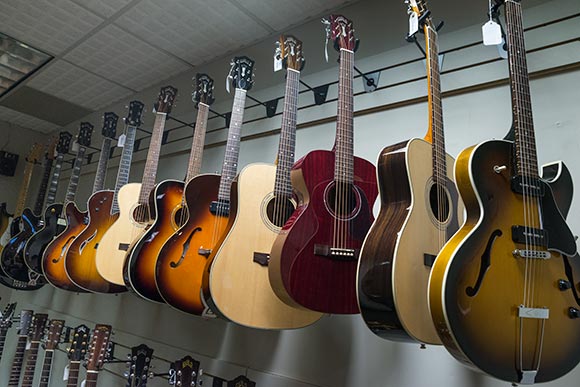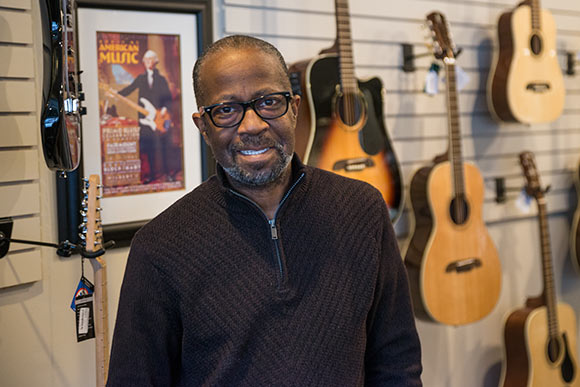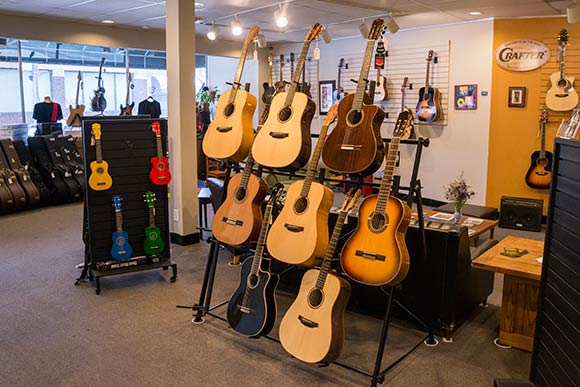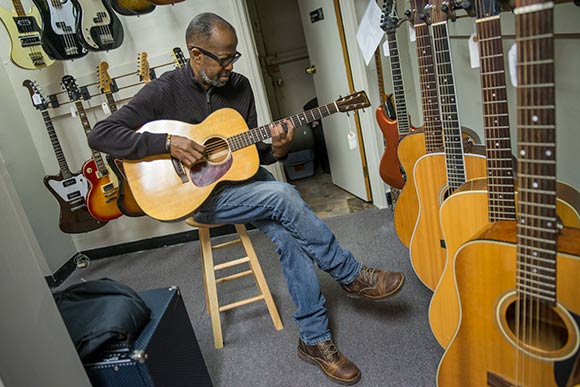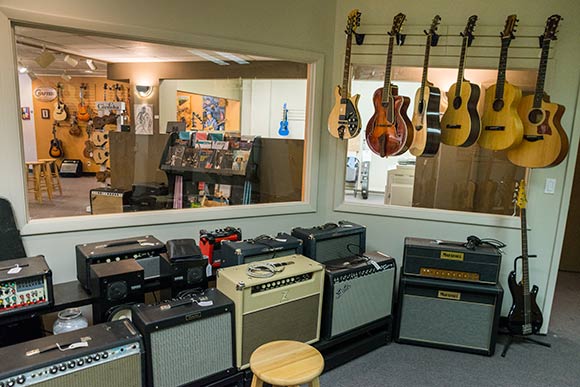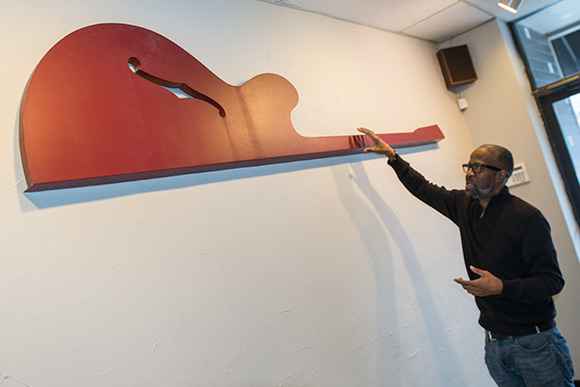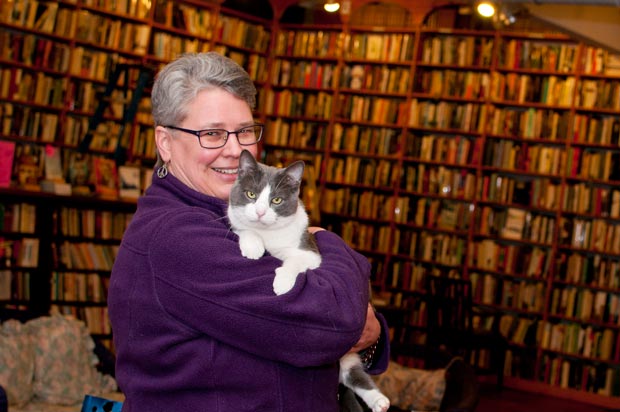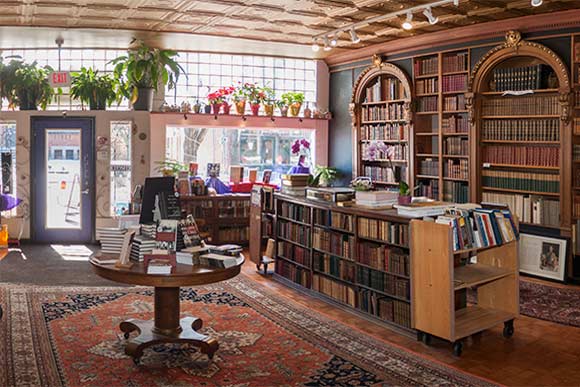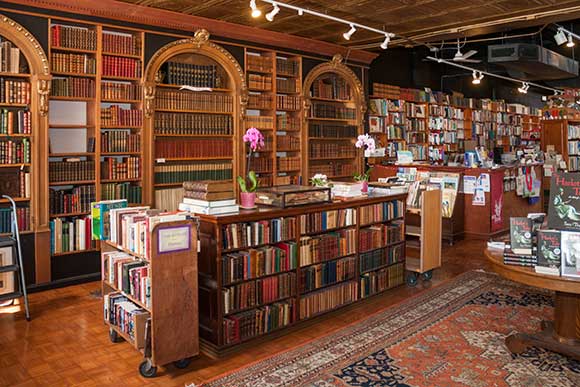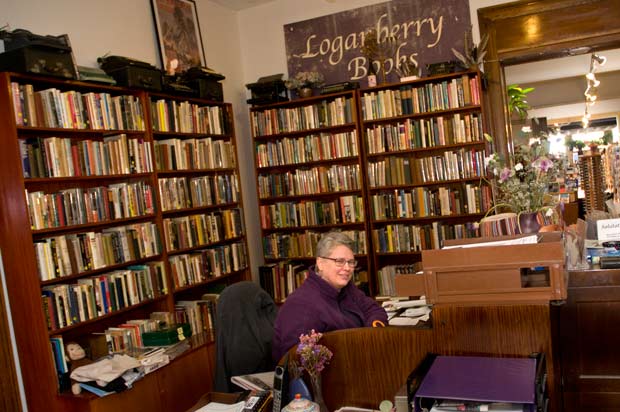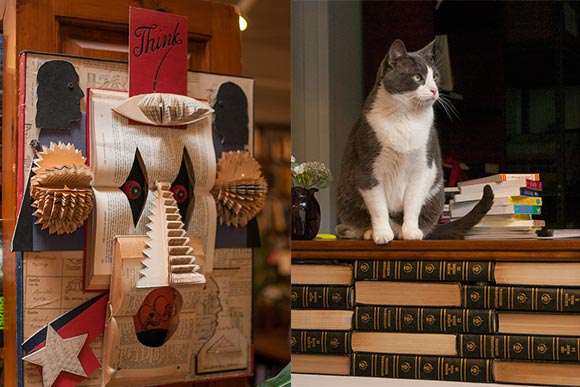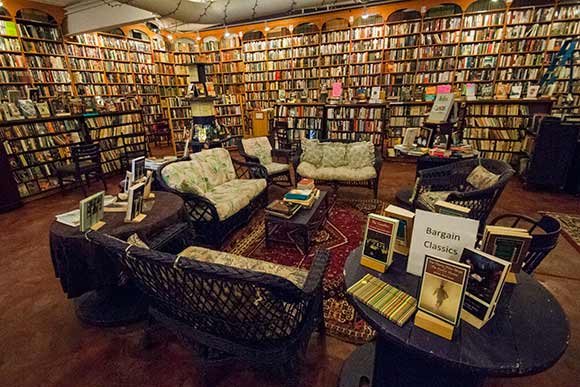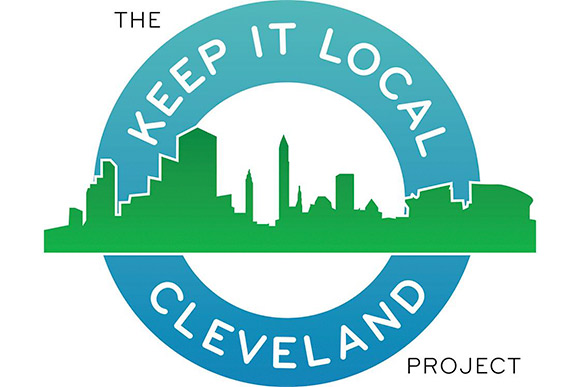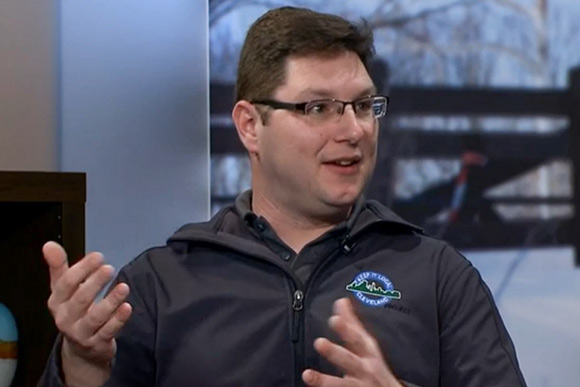Cleveland insiders: the secrets to keeping it local
When Darrell Branch of Cleveland Heights learned in March of 2014 that he would no longer be able to work at the beloved Heights Guitars on Lee Road, he was shocked and devastated. He adored the 20-year-old shop and had frequented it for a decade. He became manager in 2008.
Six years later, big box competition and a climbing rent put the go-to guitar shop out of business.
Branch bought his first “bona fide” guitar, a 1964 Gibson F25 with a double tuxedo pick guard, from the shop’s original owner, Greg Stiles. He says Stiles refused to sell it to anyone else, insisting it was “Branch’s guitar" from the get-go.
“I had always wanted to support local rather than those big box guys,” says Branch. “The thing about Greg is that he was down for the community, and (he) was down for fretted instruments. And all that attitude and care and passion I got from him.”
To that end, last year Branch, along with partner Rick Szekelyi, founded Heights Music Shop, 2174 Lee Road, in Cleveland Heights.
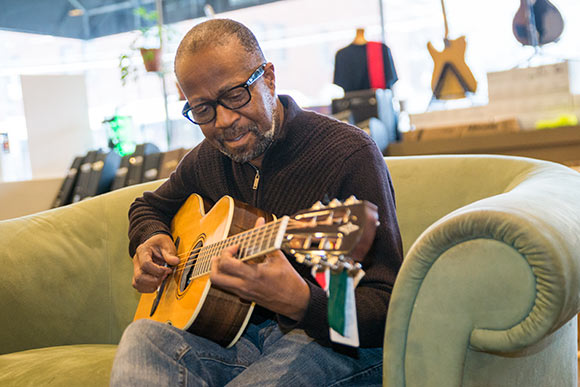 Darrell Branch of Heights Music Shop
Darrell Branch of Heights Music Shop
Clearly influenced by the shuttered Heights Guitars that was just up the street, Heights Music Shop’s November grand opening last year was Branch’s jump back into the local retail music scene. Now, Branch and Szekelyi are just one duo among Cleveland's small, local business owners devoting time and money to ventures with strong ties to their respective communities.
But as big box stores creep into neighborhoods boasting rock-bottom prices, small businesses find they must retaliate with their own unique competitive tools, from brand identity to outstanding customer service. In this ongoing David and Goliath narrative, however, smaller entities can take advantage of a symbiosis that the big boxes cannot: more and more people are choosing to shop local because it benefits the community.
 Carl BaldesareThat philosophy sparked longtime Cleveland resident and former business adviser Carl Baldesare to create Keep It Local Cleveland, a non-profit campaign that aims to inform area consumers about the smaller Davids amid all those Goliaths.
Carl BaldesareThat philosophy sparked longtime Cleveland resident and former business adviser Carl Baldesare to create Keep It Local Cleveland, a non-profit campaign that aims to inform area consumers about the smaller Davids amid all those Goliaths.
After an initial six months of research with dozens of businesses in 2014, Baldesare affirms that, especially in Cleveland, a communal preference for local has taken hold. From craft fairs to farmer’s markets, bazaars and flea markets, Baldesare sees a growing trend: shopping locally is turning into a habit.
“People have realized that buying [from] global stores is great for certain things,” he says, “but if you know that that local store is going to take 80 percent of their profits and put it back into the local economy, that definitely gives people a wonderful feeling.
"It gives them a stronger sense of community.”
Friend and Customer
For Branch, that preference to choose local, along with his affection for his customer, or “friend,” as he prefers to call them, imparts a certain resilience.
“Don’t get me wrong,” says Branch, an affable man in a felt flat cap, “I want to sell gear, but it’s the relationship part that I missed most of all [since the closure of Heights Guitars].”
Since the November grand opening, dozens of admirers, from past co-workers to businessmen, have flocked to the new storefront to say hello, chat about gear and speculate on the shop’s future. All, of course, are reasonably optimistic.
Though the factors contributing to Heights Guitars’ closure are not absolute, Branch is apt to blame it on the expenses and surrounding competition from big box stores like Guitar Center and Sam Ash Music, both of which had been in competition with Stiles since the early 1990s. Though Heights Guitars competed for more than two decades, by 2014, the group of Toledo music retailers that owned the shop succumbed to high rent and shuttered the revered storefront, much to the consternation of its customers.
“I had, like, 40 people asking me, ‘so, when are you going to open the shop? When’s it going to open?’” Branch says. “It’s because this is what the community wants. If they just wanted to buy guitars, then they can just hop on the Internet. They don’t want that. They want, first of all, to be a customer.”
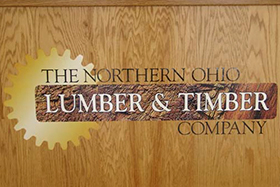 On Home Turf for the Long Haul
On Home Turf for the Long Haul
In addition to the new Heights Music Shop, there are plenty of larger local businesses in Cleveland deeply anchored to their communities. For these local giants, being on home turf is good enough to beat any big box competition.
In the case of Northern Ohio Lumber & Timber, 2850 West 3rd St., owned by Cleveland resident Charley Bredt, competition from the likes of Home Depot or Lowe’s is tempered by his business's longevity.
A long-time fixture of the Flats, Northern Ohio dates back to circa 1864 and was incorporated in 1888, when the Flats was a lumber and energy powerhouse.
When Bredt took over the business in 1981, he inherited the time-tested values of a commercial timber company, and those that make Northern Ohio unique: respect for the customer, ensuring timeliness and speedy service. All values that, he says, are hallmarks of a local business.
Bredt also suggests that his customer base, which is mostly local contractors, rarely overlaps with those patronizing home-improvement chains. Hence he asserts that longevity begets loyalty.
Baldesare of Keep it Local also notes that locally owned businesses can cater to, well, locals. For instance, Chelsea’s Vintage Clothing on the west side can’t match Halloween City’s stock, but can trump it in hard-to-find items; CVS Pharmacy can act as a one-stop-shop, but can’t supply the same hard-to-find compound pharmaceuticals Lee Silsby Pharmacy ships all over the country from its Cleveland Heights location.
“I think it’s a turf thing,” Baldesare says. “No big business is brazen enough to compete with local. It’s just not their place. It’s not even apples to oranges; it’s apples to loaves of bread.”
Hence Bredt isn’t perturbed by the behemoths. After all, they have less than a quarter of the longevity Northern Ohio boasts. Combine that with a solid word-of-mouth reputation and the well-established brand maintains an upper hand against Lowe's and Home Depot with customers that are “people who have known about us for years," says Bredt.
"It’s a totally different world,” he adds. “Our personal relationships with our customers are based mostly on this longevity we have. I think it’s not a fair comparison when it comes down to it.”
There are, of course, two sides of the coin. When the housing market crashed in 2008, Northern Ohio took a severe hit, mainly because the company is purely local and lacked a national clientele.
In response, Bredt cut prices drastically and near the end of the 2009-2010 fiscal year, it was those local buyers that kept him afloat.
“We survived based on the fact that most of the big general contractors in Cleveland recognized us,” he says. “Not just due to our credibility, but because when we get involved, we get involved and need to be supported.”
Fostering the Quirk
Amazon and other online booksellers would have us believe that the independent bookstore is a crumbling thing of the past, a sort of dying art form.
According to Harriett Logan, founder of Loganberry Books, 13015 Larchmere Blvd., in Shaker Heights, they most definitely are not. Conversely, she asserts, they are actually “on a resurgence.”
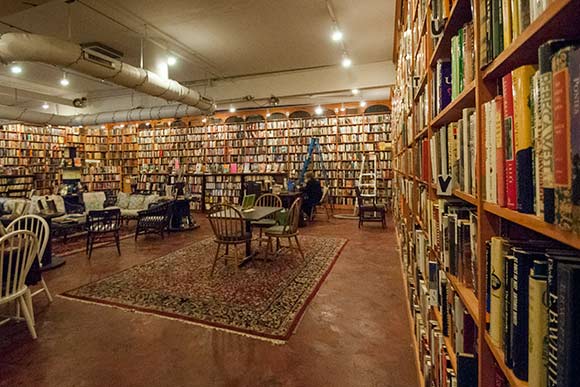 Loganberry Books
Loganberry Books
Logan’s reasoning is that people want to shop locally – especially for books.
“Not only that, they also appreciate the curated collection of books that represent their communities and thinking,” she says. “Each independent bookstore has its own personality, flavor and quirks. People like their books to be different; they like their bookstores to be different.”
Since 1994, Logan has been ensuring that Loganberry has its own set of quirks, from the giant bookshelf mural on the exterior of the building to the diverse floor-to-ceiling units on the inside. After sharing a space with a store selling oriental rugs, in 2003 Logan moved her business into the current location.
With over 21 years experience, Logan boasts an inventory of more than 100,000 volumes with one room dedicated entirely to antique books. Hence, this local staple won't be losing its luster anytime soon, even as the big box threat continues to loom.
While Barnes & Noble operates in nearby Woodmere and book-lovers may turn to Amazon to order hard-to-find titles, Logan’s response to the competition is similar to that of other independents: focus on community along with those famous quirks, such as the offbeat shopping items, mismatched vintage furniture and literary ambassador, Otis the cat.
In addition to the Larchmere foot traffic, Logan sees community as not necessarily “geographically-specific,” but more like a multi-layered entity with a dedicated fan base of book lovers, poets, artists, writers and fans from as far away as Pittsburgh and Columbus. They are connected to Logan’s shop not by proximity but by an unwavering devotion.
“Certainly it’s not just about books,” she says. “On a larger scale, you’re talking about book communities that are focused on a genre of thinking or an interest or expertise, and may not be focused on geography. There are different ways to define community. But we all need them to survive.”
Shopping Local: a Legacy
As Cleveland's small business districts continue their resurgence, Branch and Szekelyi still have yet to become the Heights music go-to. Nonetheless, Szekelyi finds instruments to consign (most recently a vintage Fender Telecaster), as Branch stands ready on his frontline, eager to engage customers, make friends and build Heights Music up to a site worthy of his former mentor Stiles.
In fact, Branch’s philosophy of giving to the community and getting something back isn’t the only thing that has stayed with him since those days. In a tweed case kept in an undisclosed part of the shop, Branch stores his prized Gibson F25 that Stiles sold him seven years ago, as one would keep a family treasure or a Bible. For Branch, it’s a good enough reminder of what comes out of shopping local.
“This one,” Branch says, as he put the guitar back in its case, "is definitely not for sale.”


